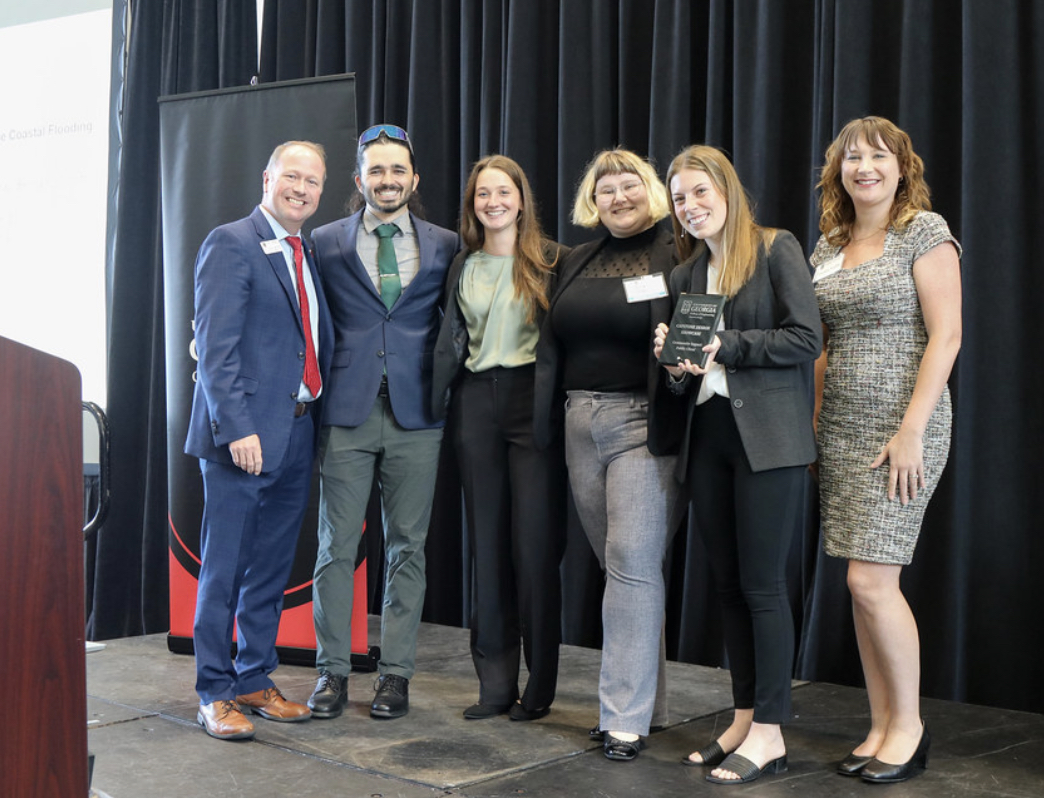Students in the College of Engineering collaborated with the UGA Office of Emergency Preparedness and Insurance & Claims Management (OEP/ICM) and the UGA Marine Institute (UGAMI) on Sapelo Island on a yearlong capstone project to develop flood control techniques for the UGAMI campus. Their work earned first-place recognition for its impact on coastal communities.
Sapelo, one of Georgia’s barrier islands, is home to UGAMI, which supports research and education in coastal ecosystems. The institute’s campus is situated along a tidal creek, making it vulnerable to severe weather events.
In recent years, coastal storm surges and high tides have caused flooding and damage to UGAMI property and facilities. While the institute has some flood mitigation measures in place, much of the existing bulkhead is in need of replacement or upgrade. This also provides an opportunity to consider nature-based solutions.
Engineering students Clare Deberry, Skylar Gray, Benjamin Smith and Sarah Younce were tasked with assessing the site, developing storm surge models, and designing potential solutions to mitigate flooding that could endanger UGAMI’s staff and campus.
The group traveled to Sapelo in October 2023 to conduct their initial site visit, take photos and measurements, and discuss concerns with UGAMI staff and OEP/ICM experts.
“Going on a site visit that lasted several days is a benefit our group had that few others did,” Gray said. “Being able to connect with not just each other but our clients in the mundanity of making dinner or forgetting bug spray was paramount to being comfortable and driven to do our best on this project.”
Over the next several months, the students conducted in-depth research to develop sustainable flood control solutions for the Institute. They considered several factors, such as costs, the proposed solution’s long-term viability and its environmental impact.
“This project was unique in terms of its challenges and incorporation of history and culture,” Younce said. “The consideration of coastal habitats and community integration is what inspired my interest in engineering my freshman year, and it was a great opportunity to apply those interests in a real-world application.”
In spring 2024, the team delivered their findings and proposed three solutions. Their recommendations included cultivating a “living shoreline” with flora and fauna along key areas of the creek, replacing and updating the existing bulkhead system — a specially designed wall that separates water from land — and installing a series of berms, which are barriers made of dense sediment that slow flooding and absorb excess water.
The group presented their project at the College of Engineering’s annual Capstone Design Showcase on April 23 alongside 116 other student teams. The months of extensive research, conversations and modeling paid off, and they took home top honors in the Community Impact for a Public Client category.
“The students were receptive to our input, and it was great to see the final product,” said UGAMI Director Merryl Alber. “They provided well-researched solutions and considered multiple angles that can help coastal communities facing flooding.”
Gray described her experience on the project as unforgettable and invaluable to her professional goals.
“Being able to talk about all aspects of my work on this project has helped me not just land a job postgraduation but build confidence in my field,” she said. “From administrative tasks such as Outlook calendars and emails to technological skills like GIS and AutoCAD, I found myself going into interviews able to speak confidently about my abilities and experiences.”
The multidisciplinary nature of the project also helped Smith jumpstart his career after graduating in May.
“Working with a diverse group of clients, including coastal specialists and emergency preparedness officials, has given me a broader perspective and enhanced my ability to adapt and communicate effectively across different sectors,” he said. “This collaboration helped me secure a coastal engineering position in Seattle, Washington.”
The project was sponsored by Alber, UGAMI Assistant Director Nicholas Macias and Executive Director for OEP/ICM Adam Fouche. The class was instructed by College of Engineering Interim Dean Stephan Durham and supervised by assistant professor Felix Santiago-Collazo.
“Learning opportunities like these help us give students crucial hands-on experience while also tackling imminent issues affecting the university community,” Fouche said. “I am grateful to the College of Engineering and to these students for the incredible work they’ve done. I was amazed at their insight, intellect and approach to problem-solving.”


